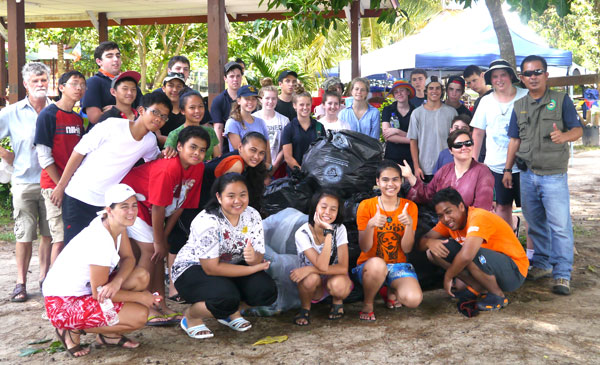Australia, Telipok students clean up Mamutik Island
KOTA KINABALU: Eighteen 15-year-old students from St Leonard’s College, Melbourne, Australia took part in a beach cleaning project at the Mamutik Island, near here yesterday.
The group, which was accompanied by eight students from SM St Peter from Telipok collected over 100kg of mainly plastic wastes that had been washed ashore from the mainland.
Retired teacher Graeme Parrot, who was accompanying the students along two other teachers Claudia Liebner and Caroline Lopez, told The Borneo Post yesterday that the trip was part of the school’s Community Urban and Environment programme, or CUE, for short.
He explained that under CUE, the students spend the year working in the community by helping out in old folks’ home, or providing food for the hungry and homeless.
Additionally, the students also involve themselves in environmental projects by clearing areas of weeds, and so on.
“The trip here is a culmination of the whole year activities and is called the big experience. Some of our students go off to Fiji, some to Vietnam, China and Laos Cambodia and some come to Sabah. In the group we have here, we have four or five who had taken up Bahasa (Indonesia), so it is also partly a language trip,” he said.
Since arriving at the state capital, the group has already been to Klias River to experience whiteWater rafting which, according to Graeme, is something the students thoroughly enjoyed.
“They’ve also tried rubber tapping, making pottery and searching for cockles at Mengkabong (Tuaran). They managed to find a few (cockles), but they enjoyed playing with the mud and throwing mud at each other more,” he said.
He added that the students had already tried several local fruits, namely tarap and rambutan.
Durian, he said, would also be on the list but not at the start of their trip.
“It is okay if you can hold your nose and eat it – it is an acquired taste, but I won’t rush and buy one. I have already tried it in my previous trip here,” he said.
One of the highlights of their visit here will be to Sandakan, to visit the war memorial where so many Australian and British prisoners of war had perished.
“Only six of them survived because they escaped. It is something gruesome and horrible but it is something they (the students) need to know. We don’t teach about World War II at school, which is a great shame, because my father and their grandfathers might have been involved and when you read about what they had to put up with, it makes us appreciate what we have today. Sandakan, in particular, was horrible,” he said.
He added that some of the things that were done by the Japanese during the war were horrid.
“There is a new book about Sandakan which I have begun to read…the students are also encouraged to read about Agnes Keith and her book, ‘Three Came Home’, but concentrates mainly on the women camp. But the men camp – they had to work all the time and were brutally mistreated. When they tried to escape, they were put in a box and left out in the sun for days. Some went mad. Many were beaten and tortured. It is important for kids to know about that.”
After the Sandakan trip, the group will be going to Kundasang to visit the war memorial there before heading to the state capital and return home on Nov 29.
Source : Borneo Post




